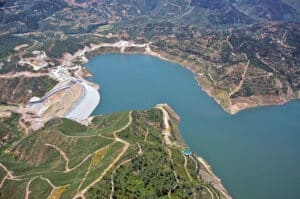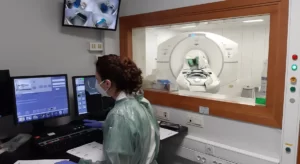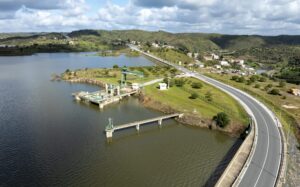Authorities have stressed that a Spanish study linking bladder cancer to the consumption of tap water ‘doesn’t apply to Portugal’.
Said a source for the environment ministry, the level of compliance with rules on the use of disinfectant chemicals (trihalomethanes, or THMs) is 99.4%, and any lapses are ‘communicated within the space of a day’.
Bottom line, says the ministry, is that “the population can drink tap water with confidence”.
Lusa news agency suggests otherwise.
Publishing online this morning, Lusa writes that Portugal “is among countries in which the concentration of trihalomethane compounds show peaks that exceed the maximum of 100 micrograms per litre permitted by the European Union”.
These peaks, or spikes, also “exceed levels stipulated in national legislation”.
The Spanish study – compiled by investigators at the ISPB (Institute of Public Health of Barcelona) – establishes a direct link between the roughly 6500 annual cases of bladder cancer in Europe with exposure to (highly toxic) trihalomethanes in tap water.
Portuguese urologist Fernando Calais da Silva told tabloid Correio da Manhã that in his opinion the report is “very well done and contains credible information.
“Tap water is not always bad”, he stressed. “Sporadically there are peaks where it goes out of control”.
Countries with the highest incidences of bladder cancer attributable to THMs are Cyprus (23%), Malta (17%), Ireland (17%), Spain (11%) and Greece (10%).
Portugal comes next on the list, with 9.1%.
At the opposite end of the scale are countries like Denmark, Holland, Austria and Germany, with either no incidences of bladder cancer attributable to the consumption of tap water (in the case of Denmark), or minuscule values: 0.1% in Holland, 0.2% in Germany, and 0.4% in Austria.
Said Calais da Silva, the problem is one that affects the poorest countries: “countries with the worst infrastructures, and worst conditions for treating water. This is the kind of problem that can only be resolved at government level…”
EPAL – the Portuguese water authority – is quoted as telling Correio da Manhã today that it “guarantees” all parametric values are complied with, “in accordance with current legislation”.
The study’s lead investigator Cristina Villanueva told Lusa that one of the greatest challenges her team faced was actually getting access to data from every EU country.
In the case of Romania and Bulgaria, no data appears to have come through – thus the study cannot give any kind of idea on how safe for drinking the tap water in those countries may be.
Trihalomethanes are made up of ‘four organic compounds: chloroform, bromoform, dibromochloromethane and bromodichloromethane.
Up till now, although suspected of being carcinogenic if ingested long-term, there have been no studies showing such stark connections between the consumption of tap water ‘disinfected’ with trihalomethanes and incidences of bladder cancer.
Ireland’s health service executive, for example, is still running information on its website that says ‘temporary raised levels of THMs in drinking water are unlikely to result in any risk to health.
“Some studies suggest a link between long-term exposure to THMs (ie many years) and cancer and reproductive effects but the evidence is not conclusive.”
In fact the ‘key message’ from the Irish water authority is that “the use of chlorine to ensure safe drinking water is one of the greatest public health achievements”, and that “the benefits of using chlorine to treat our drinking water are much greater than any possible health risk from THMs”.




















